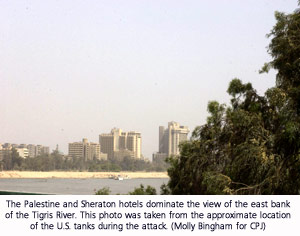1,000 deaths: Journalists who gave their lives
When Mick Deane was killed in Egypt on Wednesday, he became the 1,000th journalist documented by CPJ as having died in direct relation to his work. The photos above, a sampling of those who have died over the past 21 years, serve as a powerful reminder of the cost of critical, independent journalism.
As Cairo speech nears, concerns for Obama
Dear Mr. President: The Committee to Protect Journalists is writing ahead of your scheduled speech in Cairo on June 4 to bring to your attention important matters that are crucial to the long-term success of your stated goal of engaging the people–and not just the regimes–of the Arab and Muslim worlds.
Five years after deadly Palestine Hotel and Al-Jazeera strikes, unanswered questions linger
New York, April 7, 2008—Five years after a series of U.S. military strikes against media outlets in Baghdad killed three journalists, CPJ calls on the U.S. military to fully investigate the incidents and make its findings public. CPJ also calls on the U.S. military to implement procedures to address the presence of journalists on the…
Attacks on the Press 2004: Iraq
IraqFor the second consecutive year, Iraq was the most dangerous place in the world to work as a journalist, and the conflict there remained one of the most deadly in recent history for the media. Twenty-three journalists were killed in action in 2004, along with 16 media workers.

Army finds no fault in Palestine Hotel shelling
New York, November 5, 2004—Nineteen months after a U.S. Army tank opened fire on a Baghdad hotel full of journalists, killing two and wounding three others, the Pentagon has released a redacted report concluding that coalition forces bore “no fault or negligence” in the shelling. In August 2003, the Pentagon had released summary findings about…
Attacks on the Press 2003: Iraq
The U.S.-led war in Iraq proved extremely dangerous for journalists. More than a dozen lost their lives reporting there in 2003, and many seasoned war correspondents have called the postwar environment the most risky assignment of their lives. With the demise of Saddam Hussein’s repressive regime, Iraqi media have flourished, but news organizations faced potentially…
36 JOURNALISTS KILLED FOR THEIR WORK IN 2003More than a third killed during conflict in Iraq
New York, January 2, 2004—A total of 36 journalists were killed worldwide as a direct result of their work in 2003, according to the Committee to Protect Journalists (CPJ). This is a sharp increase from 2002, when 19 journalists were killed. The war in Iraq was the primary reason for the increase, as 13 journalists,…
CPJ REQUESTS INFORMATION FROM U.S. DEFENSE DEPARTMENT ABOUT JOURNALISTS KILLED IN IRAQ BY U.S. FORCES
New York, October 8, 2003—Exactly six months after the U.S. shelled the Palestine Hotel in Iraq’s capital, Baghdad, and an air strike hit the Baghdad bureau of the Qatar-based satellite broadcaster Al-Jazeera, the Committee to Protect Journalists (CPJ) filed three new Freedom of Information Act (FOIA) requests related to the incidents with the U.S. Defense…
CPJ condemns journalists’ deaths in Iraq Group calls for an investigation
Dear Secretary Rumsfeld: The Committee to Protect Journalists (CPJ) is gravely concerned by a series of U.S. military strikes against known media locations in Baghdad today that have left three journalists dead and several wounded. We believe these attacks violate the Geneva Conventions. This morning, Baghdad time, U.S. air strikes severely damaged the Baghdad office…
CPJ condemns journalists’ deaths in Iraq Group calls for an investigation
New York, April 8, 2003—The Committee to Protect Journalists (CPJ) sent a letter today to U.S. secretary of Defense Donald Rumsfeld expressing concern about U.S. military strikes against known media locations in Baghdad this morning that left three journalists dead and several wounded. CPJ called for an “immediate and thorough investigation into these incidents” and…